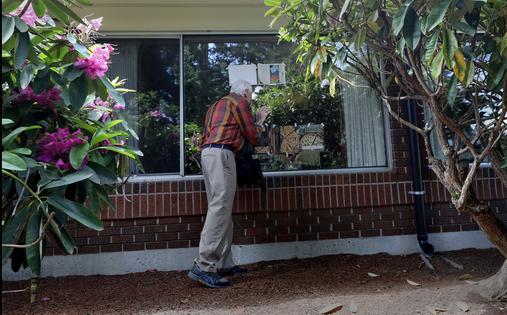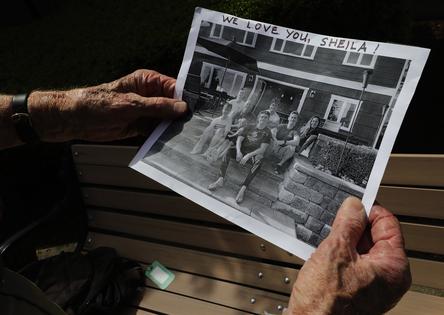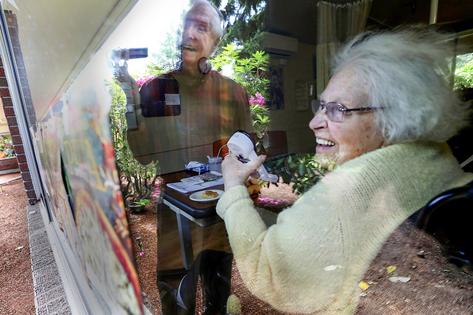Married for decades, separated by COVID-19
Published in Senior Living Features
SEATTLE - When the COVID-19 pandemic forced the nation into lockdown, long-term care facilities were chained the tightest. Residents of Washington's nursing homes, assisted-living wings and memory-care units were limited to their rooms. No touching, no walks, no connections.
Meanwhile, their loved were on the outside, speaking through phone calls, dropping off care packages and waving from parking lots. Those rules are loosening, but with strict limits; even hand-holding still isn't allowed.
These restrictions had a specific impact on couples with one spouse living in a facility and the other someplace else. They've spent most of their lives together, and their initial separation was supposed to be the hardest part. They reassured themselves there were still visits, outdoor excursions, even vacations. They could still be with their partner, their sweetheart, their beloved.
Until lockdown.
Over three months, The Seattle Times followed the experiences of couples separated because of COVID-19-related lockdowns at senior facilities. These are the stories of who they are, how they coped and where they are now.
Don and Sheila Belcher
Married for 60 years
Don: Lives in CRISTA independent senior living
Sheila: Temporarily living at CRISTA Rehabilitation Center
On the window of his wife's room at CRISTA Rehabilitation Center in Shoreline, Don Belcher taped a cardboard display he hoped would give Sheila Belcher a boost for the day. Facing outward are images of spinach and tarte flambee pizza, giving away that the displays were once pizza boxes.
Taped against them and facing inward are photos from their life. Every three or four days he rotates the photos: their adult children with their families; their son when he was 3 giving his mother a flower; their first grandchild and his fiancee, beaming with joy; a scene from their 60th anniversary luncheon.
Had Sheila, 84, not fallen and fractured an ankle bone, the couple would be together at their apartment in Cristwood Park, a few minutes' walk from the rehab center on the CRISTA campus. She began her recuperation at CRISTA in early March, just as lockdown began.
More than 60 years into their marriage, Sheila and Don Belcher were separated at length. Twice a day, every day, Don, 86, walks around the corner from the building's entrance, through a thicket of flowers, to the window, where Sheila is waiting. She picks up a call on the room's landline and hears her husband's voice.
"How are you doing, sweetie?" he asks. "Did you get the apples?"
Before his morning visits he makes a list of emails, messages and cards he's received, news events, and evening TV options he wants to tell her about. Tonight, they're planning on watching a mystery. He'll bring over items and food she's requested, like sliced apples to sit on her tray. He comments on her yellow cardigan; she says that she's bored in there without him.
"He comes twice a day, whether I like it or not," she jokes as they talk on the phone.
Their conversations surround their memories together. They met in Philadelphia, where she was studying medieval history and he was in medical school. For 10 years they taught in Ghana and Ethiopia, where Sheila gave birth to one of their children in a bedroom.
They moved to Seattle permanently in the 1970s. Sheila enjoyed meeting international students at Seattle colleges; in total, their family hosted 100 students from other countries over the years. Don says Sheila is the most interesting person he has ever known, with a laugh you can hear across the room.
"These memories lift us beyond our immediate circumstances and concerns," he says. "And make us grateful again for our long journey together."
Sheila has to remain in the facility until she can bear weight on her ankle. Once she can, Don says, "I'll get to have her back."
"Bye, sweetie," he says to his wife through the window. "I love you. I'll look forward to seeing you this evening."
Update: Sheila has moved back to the couple's unit in independent living. "We are glad to be together again," Don said.
Pan and Bob Smith
Married for 45 years
Pan: Lives in Edmonds adult family home
Bob: Lives in Edmonds house
Last winter, Pan Smith had no issues with walking or talking. She might get lost, or what she said sometimes didn't make a whole lot of sense, but given that she was diagnosed with Alzheimer's, her family felt fortunate.
She recognized visitors, and she had a lot of them coming in and out every day, until lockdown. Within two months of not seeing her husband and children, Pan, who is 71, was bedridden, unable to eat or sit up on her own.
Her husband of 45 years, Bob Smith, watched his wife's decline through FaceTime.
"Here my wife is sick with this scary disease, and I can't hold her hand, I can't be with her," said Bob, 71, who lives in the couple's home in Edmonds. "It was killing me."
Pan Smith - her nickname is "Pan," though she wouldn't correct someone if they called her "Pam" - moved to a memory care facility last December, as her dementia worsened to the point she wasn't safe in their home. The first month was great, Bob says. She had visits from family members, friends and members of their church, where she worked as a receptionist and was known as the "jelly bean lady" because she gave out candy.
After the facility closed its doors to visitors, Bob and Pan would check in using an iPad, though she didn't always understand how to use it. Then residents started reporting COVID-19 symptoms, and nurses were too busy to help Pan with the iPad. She didn't understand why she didn't have visits; Bob worried that she or the other residents might think they were being held hostage.
"With Alzheimer's, time is a sacred commodity, and the weeks, hours, months are just very sacred," said their daughter Molly (Smith) Machado. "I have no doubt that our absence dramatically impacted her. It was my clear my mom was going through trauma and was afraid and scared and alone."
Around the same time as the facility's outbreak, Pan was hospitalized for non-virus-related health issues. During the third hospital visit, she tested positive for COVID-19, though it didn't affect her lungs in the ways it has for other seniors. It caused her dementia to worsen. When she was released, doctors told the family that she would need hospice care.
Because she's considered to be in an end-of-life situation, Bob was able to visit her, first at the memory care facility and then when they moved her to an adult family home with five other residents. He talks to her, holds her hand, feeds her, which takes about an hour. He plays a recording of her singing when she was 16 that their son digitized from a reel. Her eyebrows raise when she hears her voice. She seems to recognize him, the man she met through friends in the Bay Area and married in 1975.
"She knows who I am, because she doesn't get as excited to see me as she does when she sees one of the kids," he said. "I don't know if maybe she thinks I'm the one who locked her in."
He's not sure if the lockdown made her decline faster. But he wishes he could have visited her every day. She would have been better off that way, he says.
"It's just sad," he said. "We wanted more time."
Update: Pan Smith remains in her adult family home. She continues to decline, her daughter said.
Diane and Jim Lewan
Married for 44 years
Diane: Lives in Federal Way house
Jim: Lives in adult family home
It has been five months since Diane Lewan last saw the man she has been married to for 44 years this month. It has been about that same amount of time since they've had a conversation.
They live close to each other. Diane, 90, lives in their Federal Way house; Jim Lewan, 85, lives in a nearby adult family home. But their phone conversations haven't gone well because Jim can't really speak. Seeing each other in person, separated by space and a pandemic lockdown, would be too much for Diane to handle.
"To see each other and not be able to communicate, and all I could do was wave, to me that would be too emotional," she said. "To see him and not really visit him."
Unable to use his legs because of a stroke, Jim spends most of his time in a wheelchair or bed. His speech is limited to a few words, so pre-pandemic visits consisted of sitting together and watching television. Jim would look at the screen and say "wow." He was diagnosed with Alzheimer's, but he could usually recognize his wife.
On March 13 - Diane knows the exact date - she went to see him and was told she couldn't. There was a restriction, and she wouldn't be able to see her husband until the pandemic settled. Goodness knows when that is going to be, she said.
The two first met at what was essentially a blind date at a dinner. Diane had an extra ticket to the dinner hosted by Washington Mutual, where she worked, and her manager suggested she take his friend. They met at the event, and "things seemed to click." But she didn't hear back from him, so she called him herself. That's how it started. They enjoyed each other and had a lot of fun.
Diane was divorced with four daughters, and Jim had never been married. She basically proposed to him, she said with a laugh.
After he retired from Boeing, the couple filled their time with going out to lunch every Saturday and going on cruises. They enjoyed each other's company.
His decline began in 2016, after his first stroke. Then came head injuries, more strokes, and the moves to a rehab center and finally his adult family home.
She's in regular contact with his caretaker and feels confident that his health is stable. The care isn't what she's worried about. She wonders how much he is aware of what's happening: Does he really know that Diane isn't there? Does he understand why she isn't?
"It's difficult not being able to see him and know he is well and reassure him that I am well, too," she said. One of her daughters visits a few nights a week and helps around the house.
Diane goes grocery shopping, wearing a mask, of course. But she misses her husband. Maybe, she, thinks, it's actually more difficult for her than it is for him.
"I really just miss his company and his sense of humor," she said. "It's so sad that he is such a good fellow and that this would happen to him. To have this happen doesn't seem fair."
"Goodness knows" when Diane will see Jim again. She just hopes her husband remembers her.
Update: Diane Lewan visited Jim in early September, on their 44th wedding anniversary. During their outdoor, socially distant meeting, she recounted their honeymoon in Westport and their night at a local tavern, though he couldn't recall it. When she said goodbye, she pretended to throw him a kiss, and he smacked his lips back at her. "He looks well and is being taken care of, so I'm at least content about that," she said.
Cheng and Yao Hsu
Married for 52 years
Cheng: Lives in Aegis Gardens in Newcastle
Yao: Lives in Renton house
Not much was said during the first outdoor visit between Cheng and Yao Hsu, who have been married for 52 years and unable to see each other since mid-February.
Cheng, 79, has advanced dementia. Yao has stage IV cancer. Both have trouble talking. But when Cheng did speak, he talked about how nice his wife looked, even with a mask.
"It was tough emotionally," said their son, Mike Hsu. "Mom started crying and there's not a lot of words, but it was a very special moment."
Yao, 77, used to visit her husband at Aegis Gardens in Newcastle daily, though the frequency dwindled starting in November, when she received her cancer diagnosis. But Cheng would occasionally come back to their house in Renton. His last trip home was in mid-February, before Aegis shut its doors in the pandemic.
Cheng has lived at the Newcastle facility for about two years. He seems to recognize his loved ones, and his long-term memory is fairly strong. He and Yao were introduced by a family member in Taiwan. They lived in Topeka, Kansas, where Cheng was a urologist, but they always wanted to retire in the Seattle area to be closer to Yao's extended family. They moved here in 2014.
The couple connected through FaceTime calls during the lockdown; Cheng would often ask if someone could take him home or if they could go out to eat. In July, they got to see each other with Aegis' "outdoor living room," a 7-foot plexiglass dividing wall on three sides that allows residents to meet with visitors outside. Aegis has used the model at several of its facilities in the region.
One nice part about the outdoor living area was its proximity to the parking lot, so Yao didn't have to walk a long way, Mike said. There was a spot for her to plug in her portable oxygen tank. Each side had a table with a vase of pink orchids.
Cheng called Yao and Mike by name, and they talked here and there during their 30 minutes with each other. But for the couple, the conversation wasn't the most important part, Mike said.
"A lot of it is just sitting there," he said, "and being together."
Update: Yao Hsu died Sept. 7 surrounded by her sisters, children and grandchildren. Cheng Hsu told his wife he loved her through FaceTime. On Thursday, he was able to visit her one last time, at the funeral home.
Visit The Seattle Times at www.seattletimes.com












Comments